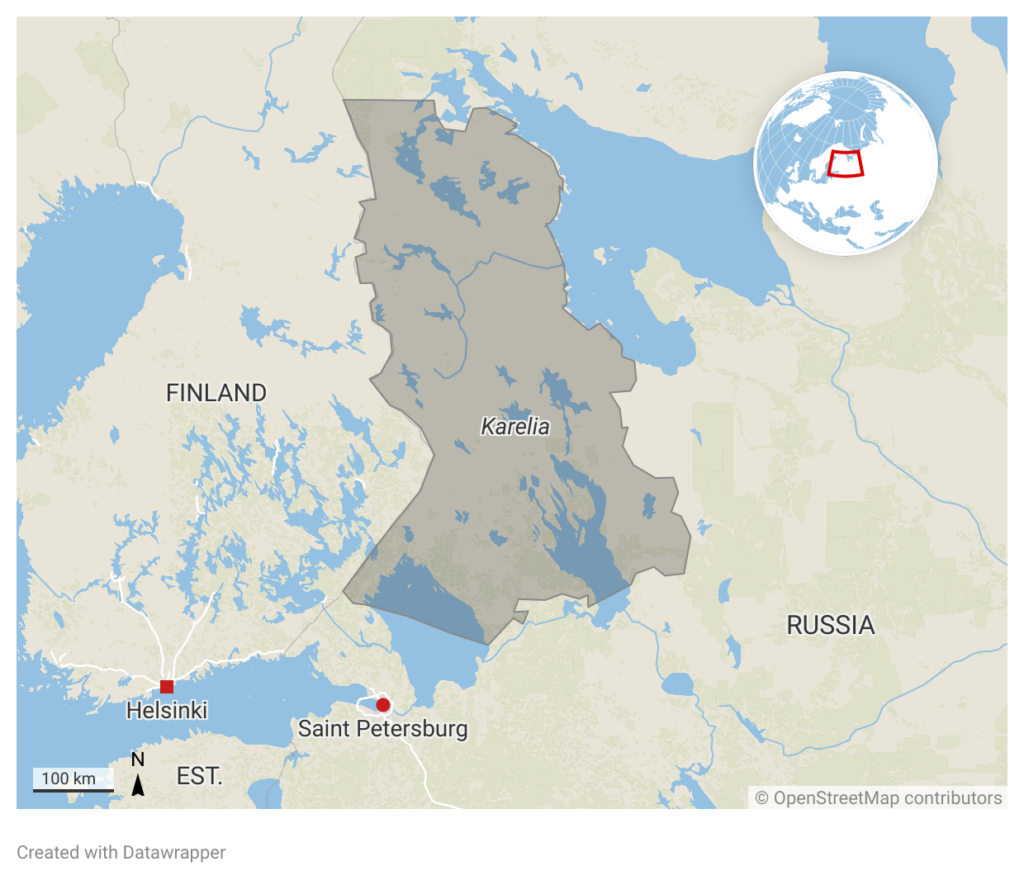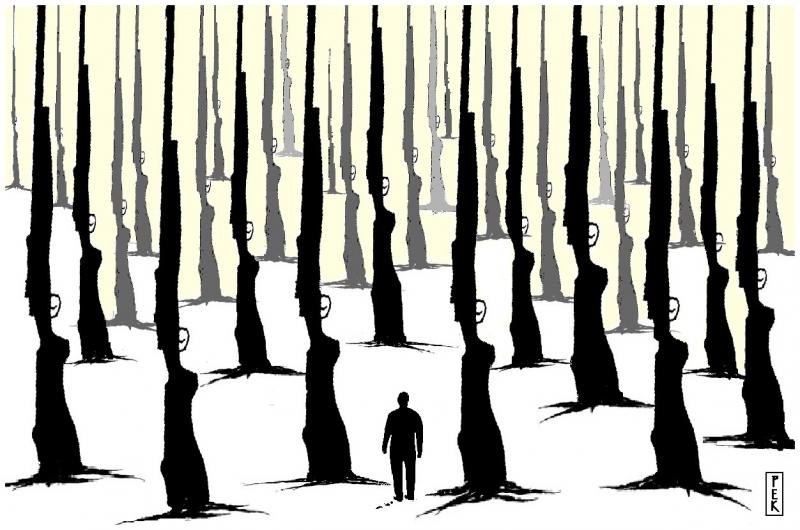Between June and November 2022, Russia’s largest timber company, Segezha Group, opted out of logging moratorium in ecologically valuable forests across Russia: in Karelia, Komi, Krasnoyarsk, Irkutsk, and Arkhangelsk. According to World Wildlife Fund data, the total forested area that Segezha withdrew from protection and is now allowed to log is 1.5 million hectares (3.7 million acres). In Karelia, the company has already decimated 680 hectares (1,680 acres) of valuable forest.
Environmentalists told iStories that Segezha refused to protect valuable forest because the principle of sustainable land use no longer made economic sense for the company. After the start of Russia’s full-scale invasion of Ukraine, began the European Union imposed sanctions on the import of Russian timber products, and the international organization the Forest Stewardship Council (FSC) suspended certifications for responsible forest management in Russia. To be certified, companies had to leave a certain amount of old growth forest that they leased intact. Certification allowed Russian timber companies to trade in European markets.
Olga Ilina, a spokesperson for a Karelia nature preservation organization called SPOK, says, “We have a long history of cooperation with Segezha. The ecological values [the company] proclaims are an absolute necessity.” But, says Ilina, Segezha stopped abiding by the moratorium on logging last year, as soon as it lost access to “ecologically sensitive markets” because of Russia’s invasion of Ukraine.
‘Intact forests ensure favorable conditions’
The area that Segezha withdrew from the logging moratorium is one of the last large tracts of untouched taiga in Karelia. Researchers have found large herds of the endangered northern forest deer, as well as more than 70 species of endangered plants, fungi and animals. The trees there can reach 300 years of age. If the company continues to develop the forest, all these species will suffer - and so will the people.
"Intact forests provide favourable conditions. Droughts, extreme temperatures, rainfall at the wrong time – these dangerous weather events are linked to climate change, including the loss of intact forests. There's plenty of evidence that intact natural systems provide a stable climate. If we destroy them, we destroy our children's future," says Olga Ilina.

Environmentalists in Karelia have tried to persuade Segezha to maintain the ban on logging in intact taiga. "They said they'd lift the moratorium because the FSC had left Russia. But this area is valuable regardless of whether the company is certified or not," says the chairman of SPOK. "To be honest, we were counting on their common sense.
Interesting article?
It was made possible by Voxeurop’s community. High-quality reporting and translation comes at a cost. To continue producing independent journalism, we need your support.
In January 2023, however, SPOK employees noticed that Segezha had started logging. According to the environmentalists, the company had violated several federal laws on the protection of the environment, wildlife and endangered species.
The environmentalists appealed to Karelia's environmental prosecutor, who contacted the region's Ministry of Natural Resources. In February, the ministry said it had reached an agreement with Segezha and that the company had promised to stop logging in the area of a planned nature reserve, but stressed that the logging didn't violate any existing laws.
‘The lesser of two evils’
If an area does not have protected status, the only forces trying to defend it from business interests are NGOs and activists. In Karelia, SPOK has been identifying and trying to protect intact forests for more than 20 years. Olga Ilina says that the state has no obligation to monitor areas without protected status
In Russia, protected areas account for only 15 percent of the country's intact forest. Much of this intact forest has been leased by timber companies, and these areas are constantly shrinking due to logging and forest fires. Between 2000 and 2020, Russia will lose a further 15 per cent of its intact forest area - more than the global average. In recent years, unprotected forests have been disappearing at an even faster rate. At the current rate, they could disappear altogether in 20-30 years. To combat this trend, environmental organisations have been trying since the 1990s to persuade timber companies to voluntarily agree not to log certain areas.
Since at least the 1990s, Karelia's untouched taiga has been recognised as particularly valuable. In 2007, regional planners decided to include it in a nature reserve. In the 2000s, SPOK persuaded the companies leasing untouched taiga to refrain from logging in the proposed reserve and to sign moratorium to that effect. These companies later became the Segezha Group.
In Russia, protected land accounts for only 15 percent of the country’s intact forest. Much of that intact forest has been leased by timber companies, and those territories constantly shrink due to logging and forest fires
“The moratorium we signed with the companies were a choice between the lesser of two evils, because saving the entire territory was impossible, the companies would never agree to that,” says Ilina. They tried, instead, to get companies to agree not to log the least fragmented, most remote parts of the taiga, where the most valuable species are.
Permanently protecting a territory from logging means obtaining special status from the government, and that can take years to achieve. In January 2023, the Karelian Research Center began that process. Even if the territory does receive special protected status a few years from now, it will be open to logging until that point.
‘Après moi, le déluge’
In February 2023, Segezha posted on its official Telegram channel that the company supports the Karelian Research Center’s efforts to create a preserve and that they would remove the territory in question from their logging plans. But neither an agreement with the Natural Resources Ministry, nor public support for the preserve prevented Segezha from continuing to fell trees. In early April, SPOK activists noted that the company had cut another 140 (346 acres) hectares of valuable forest. In total, since late November, the company has destroyed 680 hectares (1,680 acres) of old growth – almost 2 percent of the planned area of the preserve.
Cutting down trees isn’t the only problem to come with developing untouched territories. “Logging in those parcels isn’t just logging, it’s also laying roads. Poachers can use the roads. That increases the risk of physical harm to animals. And it fragments an untouched mass: even a dirt road can be an insurmountable obstacle for small animals. The area where animals can live is shrinking and their numbers are declining simply because the territory where they can live normally is getting smaller,” said one expert on environmental legislation.
The state of forests in Karelia. | Source: Globlal Forest Watch
SPOK, along with around 30 other organisations from Karelia and across Russia, has appealed to the Prosecutor General about the planned preserve. But if the Prosecutor General does nothing to stop logging in the area, experts believe it will set a very dangerous precedent.
One expert calls Segezha’s decision to remove leased intact forest from its logging moratorium “a stain on the reputation” of Russia’s timber industries, noting that it will make any future return to “ecologically sensitive markets” very unlikely. Of Segezha’s decision, the expert adds, “If your planning horizon is a few months, or a year at most, and you’re not thinking generally about the future, then from a purely financial standpoint the company’s actions seem completely logical. As they say, ‘Après moi, le déluge.’”












